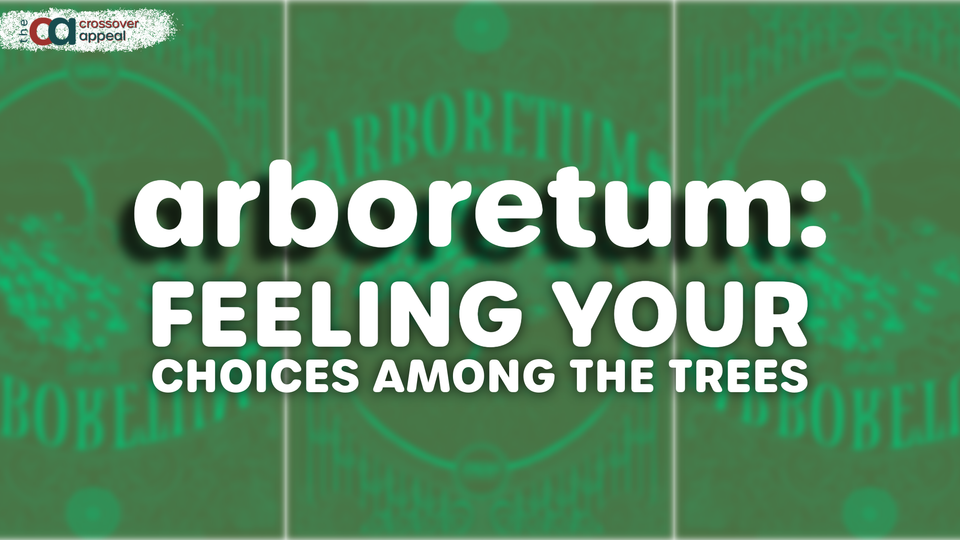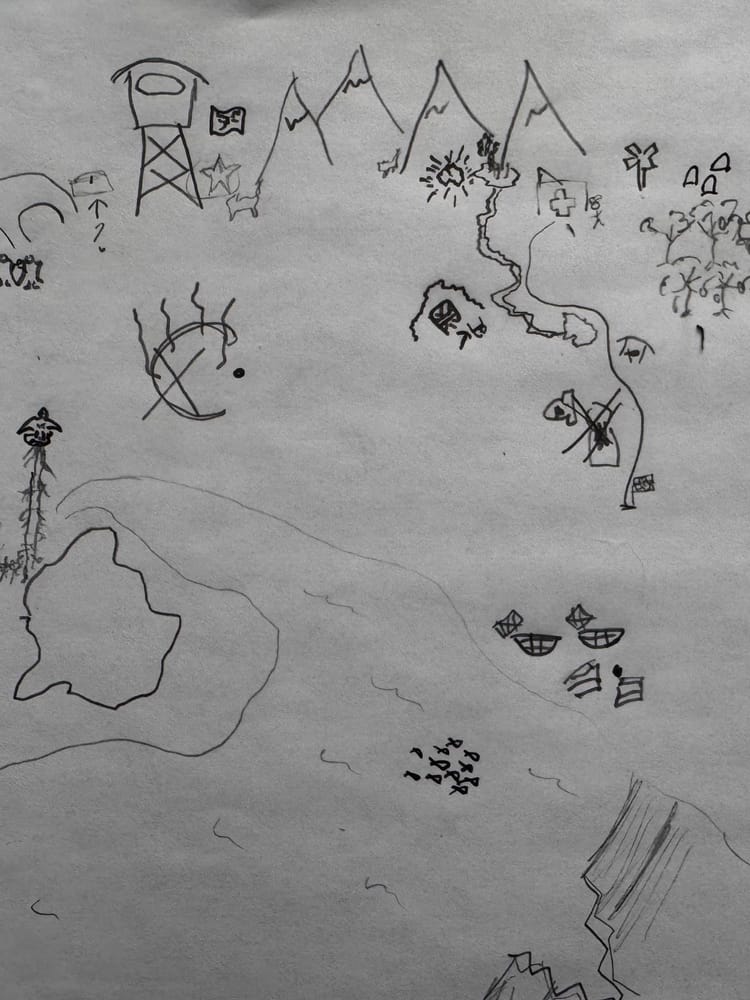arboretum: feeling your choices among the trees

Think about the last really nice garden you were in. Imagine the sounds of the birds and the cicadas and the light breeze. Smell the lilacs and jacaranda blooms as you walk past. Feel the cooling shade of the oak’s broad, leafy limbs. Notice the winding paths unfurling before your feet. You have nowhere else you need to be, there are no demands on your time or your body. It’s just you, the space some thoughtful planner laid out for you, and a dozen hard working gardeners brought to life.
How do you feel? At peace? Grounded? Relaxed?
Good. Because Arboretum, a game ostensibly about planning just such a beautiful space, will unsettle you from those gorgeous feelings and turn you into an arboreal menace, ready to bury your opponents beneath the roots of your majestic forest paths.
There are a few different ways a you might think of a board game as being approachable - and in this day and age, when some games cost more than $200, bloated with Kickstarter-backed miniatures and inch-thick rulebooks, being approachable is an underrated virtue.
First, a game can have a nice, friendly face. Maybe it looks really familiar, like dominoes or Catan. Or maybe it has a cuddly vibe, like Takenoko or Patchwork. These are the kinds of games with names, boxes, and themes that work hard not to alienate anyone, reassuring even the non-gamers in the group that they’re probably ready for this.
Second, a game can be approachable by having a clean, clear,n concise set of rules. Games in this category get you to the action quickly and they make sure that whatever questions pop up mid-game can be resolved without ambiguity. They have relatively few moving parts. They get out of their own way.
Third, a game can just be a party. Trivia games, social deduction games, push-your-luck games - all of them often feel approachable in the way that a big group of pals does. Frequently that’s because the games themselves are more about facilitating said group of pals having a good time together more than they are about cultivating a particularly strategic or aesthetic experience.
Arboretum nails two of these approachable angles. It’s a gorgeous little green and gold box, its components are legible to anyone who’s ever held a deck of cards, and its rulebook is a slim four little pages. The images on the cards are bright, colorful illustrations of a whole menagerie of trees, and the premise invites you into the soothing, verdant world of garden planning. A game of Arboretum rarely lasts more than a half hour, even with a full compliment of first-time players, and most of the scant rules slot intuitively beside each other, making it one of the easier teaches on my board game shelf. For all these reasons and more, Arboretum regularly ranks high on my list of recommendations for people just starting to build out their game collection.
Yet, for all its approachability, one google search will tell you that for many people, Arboretum is among the meanest tabletop experiences you can have. You’ll find reddit threads and bgg.com forum posts complaining of strained marriages, broken friendships, and tearful children. All these histrionics for a pretty little card game about planting trees. What gives?
To understand what makes Arboretum so deliciously mean, we have to tap for a moment into how you actually play. So buckle up for some rules exposition. The only components in Arboretum is a single deck of 80 cards. These cards are split into ten suits - each a different species of beautifully illustrated tree - numbered 1 through 8. Setup is dead simple. Shuffle the deck and deal seven cards to each player (for 2 and 3 player setups, you take out a few suits, but otherwise, setup is the same), then place the remaining cards in a deck face down in the middle of the table.
From there, players take turns doing the same three things every turn. Draw two cards, play one card to in front of them, and then discard another card. Two in, two out, every turn, no exceptions. Each card you play goes adjacent, above or below, any previous card you’ve played. And when you discard, it goes into your own discard pile as well, near the main draw deck. Once you’ve done that, your turn’s done. That’s it.
The main thing you’re trying to do as you play cards is build “paths” of orthogonally adjacent cards that go in ascending numerical order. The paths don’t even have to be in consecutive ascending order. 2-4-5-7-8 works just as well as 3-4-5-6-7. The only rule to make it a legal path is the first and last card in the sequence have to be from the same suit. At the end of the game, each card in the sequence counts as one point. If the sequence starts with a 1, add a point. If it ends with an 8, add another point. And if all cards in the sequence are from the same suit, double your score for the whole path. At the end of the game, whoever has the most points wins.
But hang on. There’s two little additional rules that make up the cruel, beating heart of this game.
Remember when I said each person has their own discard pile? Well that’s only partially true. While it is the case that only you can discard into your pile, anyone else can draw from it. When a player starts their turn by drawing two cards, they can choose to take two from the top of the draw deck, or they can mix and match, taking one from their neighbor’s pile and one from the deck, or even taking both cards from two different opponents’ discards. I love this for a couple reasons. For starters, in a game where the final whistle only blows when the draw deck runs out, this little rule means players have some control over the pace of the game. Think you’re ahead? Ignore your opponents discards and just keep draining the main pile. Need to stall for time? Just keep piddling around with your opponents castoffs while you sort things out. On top of the mild pacing control, being able to draw from your opponents discards creates a constant, boiling paranoia as you worry over whether or not the cards you’re getting rid of are exactly the ones your rivals need.
That paranoia skyrockets with the second rule. You know all those beautiful paths you’re making? The ones you’re betting on making you a ton of points? Better hope you’re still holding back some cards from that suit in your hand, because if not, you may not even get to score it at all. No matter how many paths you’ve made in your little arboreal tableau, you only score paths that begin and end with a suit for which you hold the highest total value in your hand. Meaning, you can plan out the most delightful jaunt for your nature-loving guests and find out that, at the end, some other asshole is getting the reward because he kept the 2 and the 6 of Dogwood in his hand.
Which is to say, when you’re looking at your hand - nine cards strong after drawing two at the start of your turn - you’re faced with the same realization that all my favorite games arrive at. You’re fucked.
Just as games can be approachable in different ways, there are different routes to meanness as well. Games can feel mean when they subject your long-simmering strategies to the whims of chance, like when someone rolls the robber in Catan to your two sources of wheat. They can feel mean when they ruthlessly eliminate players from play just because they made a couple early game mistakes. They can even feel mean by incentivizing players to throw punches, like when the guy across from you lands a nasty combo in Magic the Gathering. But Arboretum is mean in a slightly different way that I absolutely adore.
Arboretum makes you feel like no matter how you’ve lost, it is absolutely, 100% your fault.
When the game ends you remember every card you discarded rather than kept, every card an opponent picked up from your discard pile, every card in your opponent’s piles that you passed on, figuring you’ll get it next time around. A game of Arboretum is a graveyard of mistakes you knew you were making. Which isn’t to say that your loss feels inevitable - far from it. Therein lies the magic of this vicious little game. Turn after turn, it presents you with a choice in the simplest of terms: what card do you want to play? What card do you want to discard? Nothing is ever forcing your hand, no one has more information than anyone else, and luck shines on everyone the same. Not only do you feel like losing was your fault, but you can trace the specific steps on every shady path towards defeat. This is, unbelievably, an incredibly fun quality for a game.
Games are wonderful for a lot of reasons. High on my list of why everybody should play more games is the way they shine a spotlight on our own capacity for agency. They invite us to pause our lives, determined and shaped as they are by a million people and systems over whom we have little influence, and instead submit to rules we’ve all agreed to for the sake of measuring how well our choices navigate these new possibilities against each other. Games gives us the thrill of making big choices with the safety net of fiction - a simulation of the emotional intensity that comes with failure and success.
In my daily life, I find myself slipping sometimes into an anesthetic haze, unable to emotionally process the constant barrage of griefs, frustrations, and injustices that come along with living in the heart of the American empire. Maybe you feel the same, as you sign onto another boycott, watch another clip of AI slop, or read about the latest institutional protection to erode. Or maybe you feel that way simply from the mundane weight of waking up every day to work a job that means nothing to you to buy products you don’t really want and hopefully scrape together something that feels satisfying for a few consecutive decades. In the post-truth, AI-addled, social media age, we’re given a thousand choices to make every single day about what we consume and what we click, but our capacities to feel out which of these choices matter are under constant assault. So we make choices and feel nothing.
Arboretum transforms its pleasant premise into a machine for feeling your choices. It reduces the range of choices in front of you to the head of a pin and makes sure you feel the vertigo of trying to balance atop it. Despite the ruthlessness of its scoring, and the way it encourages you to obsess over your opponents play, Arboretum’s meanness is always reminding you of one thing: the pleasure of your own agency.






Member discussion